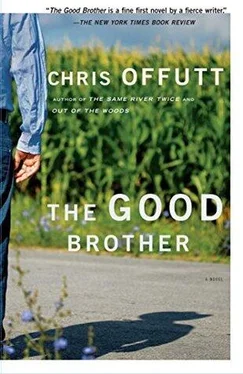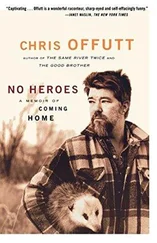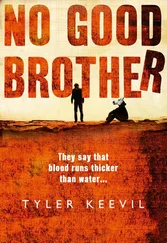“Tons more. The cities are packed with homeless people, drugs, and crime. D.C.’s a war zone and nobody does anything. Those people pay taxes and don’t even have a senator or a governor. We fought a war to end that and we’re doing the same thing in our own capital.”
“I never been to Washington, either.”
“You wouldn’t like it. People blame guns for crime, but you take away guns and you’d still have the crime.”
“Why can’t they stop it?”
“Politics, my friend, nothing but. Politicians want votes, so they ban guns and put more cops on the street. Prison is a growth industry right now. We’ve got more prisons than all the other countries combined. We’re the freest country in history and we lock up the most people.”
“You know a lot about it, Ty.”
“Everybody should. Our government is robbing us of rights every day.”
“Like what?”
“Let’s see.” Ty set his mug aside and idly fingered the pile of yarn by his chair. He squinted out the window. “You flown in an airplane lately?”
“No,” Joe said. “I’ve never been on one.”
“You wouldn’t like it. You have to show a picture ID to get on a plane. That means a driver’s license. You got one, right?”
“Sure.”
“It’s got your Social Security number on it, right?”
“I asked for a separate number.”
“Good for you. Most people don’t have that much sense. To fly in an airplane, you got to show it to some flunky. It has nothing to do with driving. It’s a passport for domestic travel. You think that’s right?”
“I never thought about it.”
“Exactly. Most people don’t. The same thing happened in Germany during the twenties — they disarmed the citizens and made them carry identification papers. And the citizens let it happen. The poor bastards just stood by and watched, That’s what’s happening here, my friend. Eight now in America,”
“We’re turning into Nazis?”
“Not literally, no. But the same things are happening here that preceded the rise of the Third Reich. The country’s broke. There’s no jobs and people don’t trust the government. The Feds are cracking down on the people. They take away their weapons and their rights and lock them up.”
Joe sipped his tea. In Kentucky, people considered all politicians to be crooked. At work he’d heard plenty of men complain about the government, but it was usually the county or the state, You either liked the current politicians or you didn’t, and it often depended on the condition of the road by your house. Many people in the hills didn’t have a driver’s license, but the reasons were practical rather than political — they couldn’t be bothered to go into town for something they didn’t use that often.
“Shouldn’t people carry ID in case they get hurt or something?” Joe said.
“Yes, and always wear underwear in case you go to the hospital. A driver’s license has your picture and your number on it. That makes it nothing but a citizen ID card that lets some folks drive. You already have to show it to rent a video.”
“I don’t rent videos.”
“Good, The states are worse than the Feds. In Wisconsin you can lose your driver’s license if you don’t pay library fines, or don’t shovel snow off your sidewalk,”
“Bullshit.”
“Those laws are on the books, Joe. Oregon has a hundred offenses where they suspend your license, but only fifty that have to do with driving. And Kentucky takes away a teenager’s license if they miss school nine times. It’s not about driving anymore.”
Joe stood and walked to the window. The sky was silver with snow. He didn’t want Ty to see his face at the mention of Kentucky. Winters at home were short. Snow came in great storms that turned the woods to chandeliers of light and melted in a week. The temperature rarely dropped below twenty and you didn’t need hobbies that lasted until spring. Joe wanted to know why Ty had come to Montana, but didn’t want to risk having to answer the same question.
“You got a checkerboard?” Joe said.
“No.”
“Deck of cards?”
“No.”
“Maybe you can teach me how to knit, then.”
“It’s tougher than it looks,” Ty said.
“I never had a hobby that was doing something.”
“What do you mean?”
“I collected stuff.”
“Sure,” Ty said. “Old money, comic books.”
“Where I’m from, there’s no new money. I collected what I could find — rocks, bark, feathers.”
“Makes it tough in the winter, huh. A lot of people, they tie flies till spring.”
“I always went to work,” Joe said. “When I was a kid we rode sleds and had snowball fights.”
“Where was that?”
“Texas.”
“You don’t talk like a Texan.”
“I can’t help it.”
“I guess you’re from north Texas.”
“Maybe.”
“Up where they get a lot of snow.”
Joe looked into his mug. Silt swirled at the bottom and he set it on the table. He felt uncomfortable that Ty knew he was lying, but he wasn’t ready to leave.
“It’s not a law to carry ID, is it?” Joe said.
“Not yet, my friend. But last year over four thousand new laws were passed.”
“That’s a lot.”
“Yep, and most are about controlling people.”
“Like what?”
“The seat-belt law,” Ty said.
“That ain’t new.”
“No, but it’s the best example of a bad law.”
“Why? What’s wrong with it?”
“Everything. Only a moron doesn’t wear a seat belt, but being a moron shouldn’t be illegal.”
“I know some people glad of that.”
“You’re missing the point. It’s the same with the motorcycle helmet law. Congress is wasting taxpayers’ money to legislate common sense.”
“A lot of folks don’t have it.”
“That’s right. Our country is the only one that makes it against the law to be stupid. Is that free?”
“Don’t reckon.”
“You’re not from a city, are you?”
Joe shrugged.
“Don’t worry,” Ty said, “I’m not trying to get personal. But the government is naming every little dirt road in the country. No more addresses like Rural Route 4, Box 60-A. Now every dead-end road gets its own private name,”
“Yeah, I know. It’s so an ambulance can get there in an emergency.”
“That’s what they’re telling you. Joe, But ambulance drivers know their territory. They don’t need a street sign at every podunk crossroad. The reason for naming roads is to provide the government with a list of every house in the country, where it is, and who lives in it. That and the national identity card give them a precise record of exactly who lives exactly where. It’s all about privacy, Joe. There is no privacy anymore. And without privacy, there’s no freedom.”
Joe didn’t consider the government an enemy. It was more of an entity to manipulate if you wanted fresh gravel on your road, or a family member out of jail. People at home didn’t worry about the government, they ignored it. Men hunted out of season to feed their children. Families made moonshine for export, and when demand changed they grew marijuana. Laws didn’t have much bearing in the hills, especially when the sheriff was an elected official.
“I got to go,” Joe said. “Getting late.”
“Glad you came over. You’ll have to excuse me for talking so much, but we all get lonely.”
“Think this snow will pass?”
“Tomorrow it’ll be deep and still.”
“What do you mean?”
“Deep as your ass and still snowing.” Ty laughed. “That’s what they say in Alaska.”
“Thanks for the tea.”
“You bet. Remember, spring will come. The main thing is to get through winter without parking one in the brain pan.”
Читать дальше












